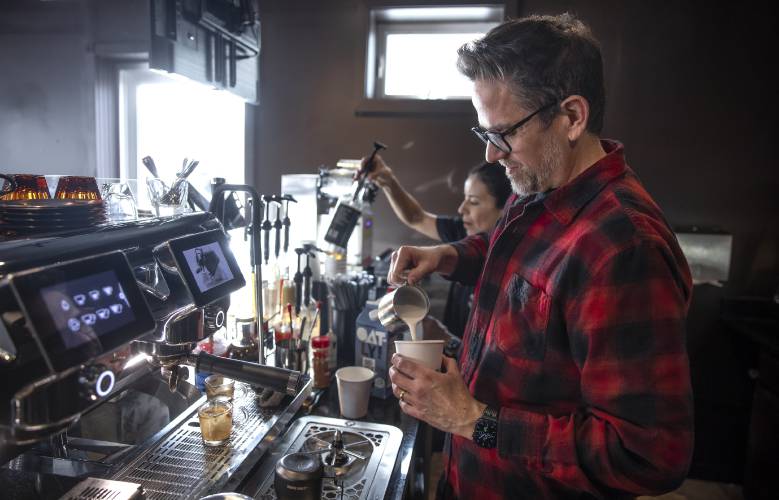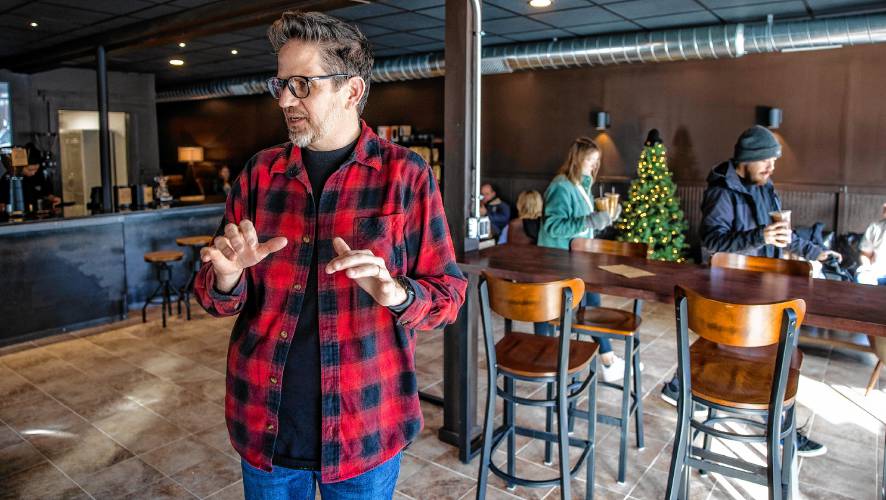From potential for growth to possible price hikes: How New Hampshire businesses look at Trump tariffs
|
Published: 04-03-2025 5:42 PM
Modified: 04-04-2025 8:09 AM |
Jonathan Hutchins isn’t rushing to increase prices on his coffee any time soon.
Hutchins owns William and Sons Coffee Co. in Concord, and despite sourcing beans from around the world, he is willing to wait to see the effects of the new tariffs under President Donald Trump’s trade policy.
“I plan to keep an eye on it, and I don’t see a foreseeable need to raise prices at the moment. But I’m being cautious,” said Hutchins after the tariffs were announced on Wednesday.
The new policy imposes a baseline 10% tariff on foreign imports from dozens of countries.
Most Americans drink coffee from Brazil and Colombia. Both countries are now facing a 10% tariff on all imports. The hit is even bigger for Vietnam, a major supplier of instant coffee. The Southeast Asian country faces a 46% tariff while Indonesia, one of the largest coffee producers in the world, faces a 32% tariff.
Still, Hutchins, who sources his beans through brokers from Colombia to China, isn’t too worried just yet. He said there’s plenty of coffee stocked in U.S. warehouses.
His next shipment is set to arrive this month, and for now, he’s holding steady.
Meanwhile, New Hampshire’s wine industry views the tariffs imposed on European countries as a chance to encourage more consumers to try local wines.
Article continues after...
Yesterday's Most Read Articles
 ‘There was no oversight’: NH child advocate has been a watchdog for children's care. Now, the office is on the chopping block
‘There was no oversight’: NH child advocate has been a watchdog for children's care. Now, the office is on the chopping block
 Volunteer group wants to help homeless clean up their camp
Volunteer group wants to help homeless clean up their camp
 ‘Less finger pointing, more communication’: Longtime Chichester residents share hopes before second town meeting
‘Less finger pointing, more communication’: Longtime Chichester residents share hopes before second town meeting
 Casella Waste Systems’ landfill project in New Hampshire’s North Country denied permit
Casella Waste Systems’ landfill project in New Hampshire’s North Country denied permit
 New Healthy Buffalo owner to build market in Chichester
New Healthy Buffalo owner to build market in Chichester
 ‘It’s everything’: In largest rally yet, Trump protestors descend on Concord
‘It’s everything’: In largest rally yet, Trump protestors descend on Concord
Ted Jarvis, president of the New Hampshire Winery Association, said while no one likes the word “tariff,” the new policy might be a “blessing in disguise” for local wineries.
“The tariffs will increase the prices of commercial wines from overseas, making locally produced wines more cost-effective in comparison,” said Jarvis. “I think New Hampshire-grown, New Hampshire-made wine can hold the line and put out a really good product for a very reasonable price.”
This means European wines, such as Chardonnay and Merlot, on grocery store shelves will become more expensive due to the Trump administration’s 20% tariff on all goods imported from the European Union.
Emma Stetson, owner of Wine on Main in Concord, has already started feeling the effects.
Her customers began reaching out to stock up on their favorite European wines as soon as the Trump administration announced tariffs on imports on April 2.
“You start to look at other things that are involved in manufacturing and shipping wine,” said Stetson. “You start thinking about fuel, airfare, ships and all of the materials and logistics that go into getting wine from one point to another. So, you’re looking at at least a 20% tariff. It could be higher if everything else is taxed as well.”
Most of the corks used in wines come from Portugal, adding another layer to the rising costs of producing local wine.
However, Jarvis’s son, Nick Jarvis, who owns and operates Black Bear Vineyard in Salisbury with his family, believes the impact will be minimal in the long run.
“It’s going to take a little bit of a hit,” he said. “But in the big scheme of things, I don’t think it’ll hurt our industry too much.”
For specialty grocery stores importing products from other countries, the new tariffs mean price increases are inevitable.
Karma Gonpo, owner of Katmandu Bazaar, an Asian and African market on Loudon Road, said he expects to be forced to mark up prices on items like imported carpets from Tibet and incense sticks from Nepal.
He also anticipates raising prices on produce and other products sourced from vendors in New York and Boston, including spices and specialty items from India and other Asian countries.
“The customers will be unhappy. We don’t have a choice,” said Gonpo. “I can’t give them what I get from the vendor — everything is high.”
Sruthi Gopalakrishnan can be reached at sgopalakrishnan@ cmonitor.com









 Henniker ponders what is a ‘need’ and what is a ‘want’
Henniker ponders what is a ‘need’ and what is a ‘want’ Boscawen residents vote to fund major renovation of public works building
Boscawen residents vote to fund major renovation of public works building ‘Voting our wallets’: Loudon residents vote overwhelmingly against $1.7M bond for new fire truck
‘Voting our wallets’: Loudon residents vote overwhelmingly against $1.7M bond for new fire truck In Pembroke, Education Freedom Accounts draw debate, voters pass budget
In Pembroke, Education Freedom Accounts draw debate, voters pass budget
